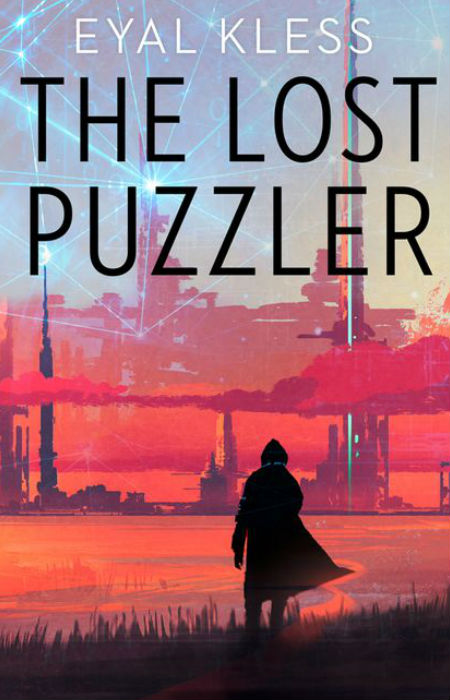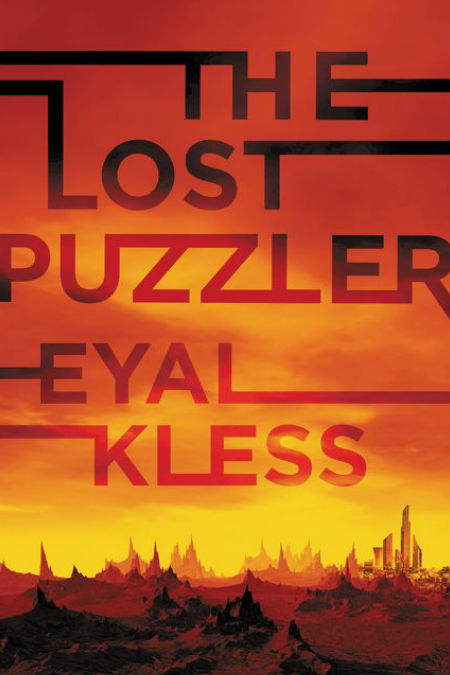
Is humanity its own worst enemy?
History is littered with example after bloody example that would suggest we are, and then some, the holders of daggers to our throats that are briefly raised only to be plunged in again and again, as we cut off our existential nose to spite our face.
But we are also, somewhat by necessity you would have to assume given our propensity for self-destructive behaviour, gifted with a tenacity for survival too, taking these copious setbacks and fashioning something new and hopeful with them …
.. until, of course, we raise and plunge the dagger again … rinse, repeat and get used to the colour red.
While we don’t see the very worst of these ruinously redemptive tendencies in play in The Lost Puzzler by Eyal Kless – the worst lies in the past in the euphemistically referred to period as the Catastrophe which left society in ruins and busted back to a dog-eat-dog Dark Ages mentality – we do see the duality of this push-pill dynamic at work in the simultaneous attempts by people to better themselves even as society crumbles to its once-promising vestiges around them.
“I still remember when the streets of the entire Central Plateau were lit by Tarakan lamps. Now, only a few blocks away from the ever-lit square, the back streets were almost pitch black, and the inhabitants were of a more sinister type. I passed several groups of people huddling on street corners, standing around heating stones and open bonfires. The people were idle, drinking and talking among themselves, but I knew they were waiting, like beasts of prey, for someone like me to come along and be dinner.” (P. 4)
The enthralling world of The Lost Puzzler by Eyal Kless is an intriguing mix of old world medievalism and cutting-edge technology, the ruins of a once-great civilisation picked over by scavengers known as Salvationists whose stock in trade is grafting the old, still-futuristic tech onto people and a society which has tumbled chaotically back into the Dark Ages.
So intriguing is this ruined world, brought alive by Kless in such an enticingly-nuanced way that you spend much of the novel in awe of the way he builds the book’s society and effortlessly populates it with compelling people, that it isn’t hard to get subsumed into a plot that is as much a dissection of the flaws and limitations of humanity as it is an immersive hunt for one person at the centre of a mystery whose genesis is as flawed and broken as the people who have suffered for it.
The message in this expansively-rich tale is that humanity, glitz and baubles aside, is wholly incapable of doing anything for altruistic reasons.
It may sound like a damnable assessment but in reality, it’s simply grounded and honest, reflecting a storyline which hints at being a standard good guys/gals vs. bad guys/gals but winningly defies those expectations at every turn.

Kless rather cleverly eschews black and white simplistic characterisations, with many of the people who fill the book the kinds of captivating shades of grey that you would expect to find in a society where survival is not a given, the future is suspect and the ruins of a once mighty technologically-advanced civilisation known as the Tarakan are all around, mocking the cataclysmic fall of the once-great Homo Sapiens species.
Even the person we first meet, who is never named but is eventually given the playful nickname of Twinkle Eyes, and who is on a mission from the LoreMaster at the Guild of Historians to find Rafik, a missing Puzzler (they alone can open the locks protecting the richest of the technological treasure troves), is not as innocent as he first seems.
He’s certainly more squeaky clean than the people he employs to protect him on his quest and whom he seeks such as the grizzled Galinak, a Troll who is a mix of humanness and added-on Tarakan tech, and Vincha, a woman on the run who is the only one known to have been with Rafik when he was last seen alive.
Moving between the past, where Rafik’s story is told, and the present, where Twinkle Eyes, Galinak and Vincha, and associated hangers-on, are on the run from enemies unknown, The Lost Puzzler seamlessly fills in the blanks, balancing the two streams so expertly and compellingly that neither one feels more worthy of your time than the other.
That’s a rarity in a chronologically-split narrative, and Kless is to be commended for not only making both strands equally attractive to read, but weaving into each other so that the picture that emerges is very greater than the sum of its parts.
“Playing with the wall of symbols made him feel a little better. Since almost dying in the puzzle prison, Rafik discovered that he could now enter a state of mind where he was in front of the wall and able to manipulate a hundred symbols at a time. Controlling the symbols had become intuitive, effortless, like walking or breathing, and he could even try to solve problems on the walls while thinking about other things, like Vincha, although he would sometimes come out of it with a pounding headache.” (P. 371)
The Lost Puzzler is a gem of a story that adroitly melds fantasy, sci-fiction, mystery and action drama into one highly-readable whole.
It is a compulsive read, one borne of clever but accessible writing, crisp, verve-filled characterisation and a sense of time and place that feels authentic even though, in the real world at least, it has never existed, and an underlying understanding and evocation of what makes people tick, and how that can be both our downfall and our salvation.
This insight permeates every last aspect of this book which neither damns nor praises humanity, rather taking the position of stark realism and admitting that we are both a force for good, and yet also our own worst enemy.
Impressively, for a novel that spends much of its compelling narrative racing towards an assumed playing out of events, The Lost Puzzler ends in an entirely unpredictable way, placing humanity, or least the representatives on hand such as Vincha, Galinak and Twinkle Eyes in an invidious position from which no starring option emerges.
It’s brilliantly inspired writing that ends as it begins, defying expectations and exploring all manner of moral and ethical conundrums even as it tells a story so human and grounded, so hopeful and yet so bleak, that it casts a whole new light on what a looming apocalypse may leave us and where, if any, we can go from there.

Thanks you,
This definitely made my day
The Puzzler’s War will be coming out Feb 2020
Eyal Kless
Great – I’m glad! It was a brilliant read and I can’t wait to read the follow-up 🙂
The Puzzler’s War is out now !